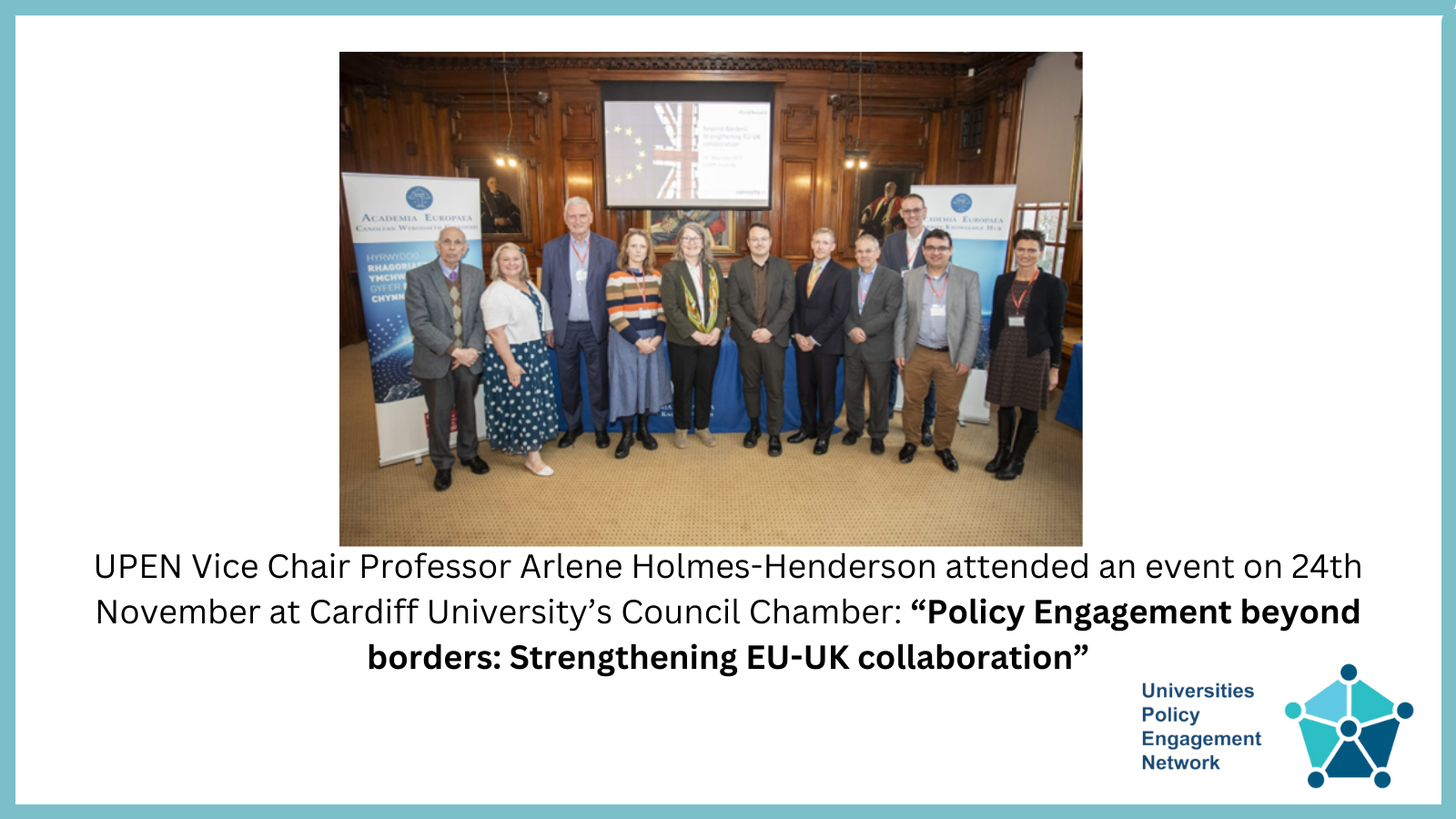Policy Engagement beyond borders: Strengthening EU-UK collaboration

UPEN Vice Chair Professor Arlene Holmes-Henderson attended an event on 24th November at Cardiff University’s Council Chamber, which brought together researchers and senior representatives from organisations such as UKRI, UKRO, WCPP and the Learned Society of Wales, to find ways to nurture research and policy engagement relationships between the EU and the UK.
The first panel, chaired by Professor Rudolf Allemann, considered the challenges and opportunities of EU-UK collaboration. Professor Christopher Smith outlined the mission of UK Research and Innovation (UKRI) and emphasised the need for UK researchers to ‘think big’ in terms of collaborative funding ambitions. He made it clear that both UKRI and the EC encourage applications from researchers who want to develop evidence to inform policy thinking.
Dr Fabia Jones explained the role of the European Parliamentary Research Office (EPRS), outlining opportunities for academic researchers to provide expertise to the European Parliament and policy departments.
The second panel session, chaired by Professor Ole Petersen, focused on policy engagement. Ole presented the work of the European Scientific Advice Mechanism (SAM) and the role of the SAPEA consortium in providing evidence reviews to support policymaking in the European Commission.
Professor Arlene Holmes-Henderson described the mission of the Universities Policy Engagement Network (UPEN), a consortium of more than 120 universities. Arlene also shared her perspectives on the importance of Arts and Humanities research for informing policy. She provided examples from the field of Classics, where her research has shaped policy directions and resulted in significant Treasury investment. She emphasised the importance of showcasing what good policy engagement looks like via case studies. She also stressed the need for policy engagement activity to be recognised and rewarded in academic progression and promotion structures.
Professor Steve Martin highlighted the work of the Wales Centre for Public Policy (WCPP). He added that multi-disciplinary research is necessary to tackle cross-cutting policy challenges and that ‘blended’ teams which bring together different kinds of expertise and insight are vital. He listed the ‘do’s’ of policy advice (relevance, responsiveness, rigour, quality of relations such as time and trust), as well as the ‘don’ts’. He emphasised the importance of dialogue between evidence producers and evidence users so they have a shared understanding of the evidence need(s).
“Context is vital which means we can’t just ask ‘what works?’. We also need to know ‘why, how and where it works’”. Professor Steve Martin, WCPP
Professor Hywel Thomas outlined the role of the Learned Society of Wales (LSW). As the national academy for arts and sciences, the LSW Fellowship brings together experts from across all academic fields and beyond. LSW uses this collective knowledge to promote research, inspire learning, and provide independent policy advice. LSW’s new strategy (2023-2029) includes contributing to major policy solutions as a core priority, with a focus on increasing policymakers’ understanding of the importance of excellent research. Policy engagement with research also cuts across other pillars of LSW’s strategy:
- Create an environment that supports Wales’s current and future experts: The panel raised a need for targeted training. LSW’s Early Career Researcher Network is a space for the next generation of researchers to learn how to engage effectively with policy makers.
- Develop a more diverse and active Fellowship: The panel also agreed that diverse voices are the key to excellent research and fair policy-making. This is why LSW is taking decisive action to bring intersectional balance to its Fellowship over the coming years.
Fellowship and membership organisations like the Learned Society of Wales can be a useful gathering place for researchers to bolster their policy voices. For example, in 2022, LSW held a series of roundtables on Innovation Policy, resulting in a report outlining considerations for the Welsh Government’s 2023 Innovation Strategy. The researchers’ evidence was amplified firstly by using the Society’s status to engage closely with the Welsh Government throughout the process, and secondly by speaking as one collective, coherent voice.
International cooperation can further boost the voice of a small nation. LSW forms part of the Celtic Academies Alliance together with the Royal Society of Edinburgh and the Royal Irish Academy. It provides a forum for researchers, policymakers, industry, and the arts and cultural sectors on the island of Ireland and in Scotland and Wales to connect, communicate and collaborate while working to strengthen understanding at the UK level of issues facing the devolved nations.
More information
Read the event programme and follow Arlene’s posts from the day on X at @ProfArleneHH










































































































